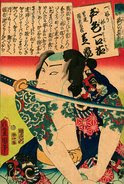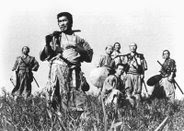
Take these lessons from Bushido and apply them to your own life
Listen up, men. There’s a lot to be gained from paying attention to other cultures, and that’s something La Cosa Nostra has done better than just about anyone. It’s also something that’s kept us turning a steady profit since it all started. Just as some corporate hawks have torn pages straight out of our manuals, we have learned a thing or two from older, more established organizations, especially those from distant lands.
I know what you might be thinking: “The Italian mob learns from other cultures? Yeah right, imagine that.” The thing is, so many uninformed people view La Cosa Nostra as being too old-fashioned for its own good, too set in its ways. It’s true that the old-school Dons --- the Moustache Petes --- who vied for power up until the mid-1900s were stuck in the old way of doing things, but this stubbornness and refusal to adapt would also lead to their eventual downfall. The next generation of leaders were savvy businessmen who could keep up with new pressures and adjust to the new demands of the American people and the ever-increasing presence of the authorities. How did they do this? They watched what was going on around them and took what they could from other similar organizations. One of these “schools of thought” was Bushido, the ancient Japanese code of conduct and the way of the samurai. Let’s take a look at some lessons from Bushido that you can learn.
What is Bushido?
Bushido is the 1,000-year-old Japanese code of conduct that nobles were required to observe and today is still practiced by men all over the world. It combined the fierce ways of the samurai class with the more serene and spiritual teachings of Zen-Buddhism and Confucianism. Above all, the code stressed “frugality, loyalty, martial arts mastery, and honor unto death,” and the ethos is still cherished in Japanese society today.For centuries, the laws of Bushido were not written down anywhere for people to read. At best, they consisted of a few maxims handed down in the oral tradition or that perhaps were passed on to others by a well-known warrior. That was until 1685, when the scholar Yamagei Yoko codified the way of the samurai and offered up seven principles that could be used as guidance for anyone who wished to emulate them.
The 7 Principles of Bushido
1- LoyaltyThe foundation of La Cosa Nostra, loyalty to one’s organization (in our case, la famiglia) was also a central point among followers of Bushido. The samurai was loyal to his overlord (his daimyo) and no one else. He didn’t have to explain his actions to anyone apart from his capo, and lived by a completely different set of rules than the rest of the Japanese populace. Remind you of anyone?
2- Honor
Death before dishonor was simply how it went for the samurai. And once honor had been been lost, the only way to get it back was by performing seppuku, ritual suicide achieved by slicing open one’s belly and letting the innards fall to the ground, all while an audience watched. It might seem a bit severe, but it perfectly illustrates the devotion that Bushido members had for their superiors.
3- Bravery
No fear of death and the idea of practicing self-sacrifice are a few lessons from Bushido. Easier said than done, right? The good samurai would never hesitate to put his personal needs last, especially if it was best for the group. It is said that a true warrior would rush onto the point of an oncoming sword if it meant that something would be gained by his clan. That type of bravery is seldom seen nowadays, and it could explain the steady decline of the American mob.
4- Respect
The samurai held a deep respect for tradition and the established order of things. In turn, they demanded respect from the masses and were well within their rights to execute, on the spot, anyone who failed to bow down to them in their presence. In my family’s line of work, it can be just as dangerous when the right people aren’t properly acknowledged and given the respect they believe they’re entitled to.
5- Benevolence
Bushido combined the spirituality of Zen with the teachings of Confucius, which meant that the individual could never be seen as any more important than any other. The ability to exhibit compassion for those less fortunate is perhaps seen as an outdated mode today, but back in the medieval ages it was expected of even the fiercest warrior.
6- Honesty
The samurai was bound by his word, and anyone who was proven to have acted insincerely was stripped of his status and subjected to the worst possible position -- that of a disgraced warrior. This might not fly today in the hustling world of the gangster, but you can be sure that dishonesty will eventually catch up with you.
7- Rectitude
The samurai believed that it was better to lose his life than to appear rude or arrogant. This type of humility is still treasured in most Asian cultures, and I constantly try to teach my men the importance of doing the right thing whenever they can.
The Bushido would like to thank Johnny Testa at AskMen.com for sending this excellent article regarding the Bushido (Way of the Warrior) to us back in May. Editor's Note: Please notice that timeliness was not one of the 7-virtues.







No comments:
Post a Comment